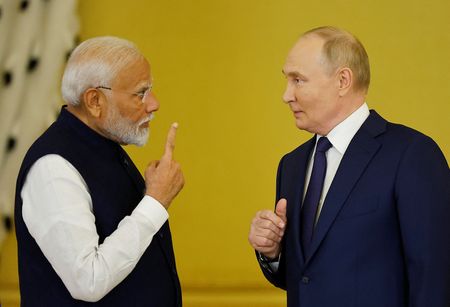By Olga Popova and Gleb Bryanski
MOSCOW (Reuters) -India increased its imports of Russian grain and grain products 22 fold, well above other major importers, in the 2023/24 agricultural season, according to data released during Prime Minister Narendra Modi’s visit to Moscow.
Economic cooperation between the two BRICS members and major agricultural powers is high on the agenda of the visit.
Modi thanked Russian President Vladimir Putin for supporting Indian farmers with stable supplies of fertilizers. At the start of the year, Russia was supplying a third of India’s fertilizer imports.
“Thanks to our friendship, we managed to resolve difficulties for Indian farmers. We met all their needs for fertilizers. This is a special role of our friendship,” Modi told Putin during a meeting in the Kremlin.
Russia and India have set a bilateral trade target of $100 billion across a “broad base” by 2030, up from the current $65 billion, Indian Foreign Secretary Vinay Mohan Kwatra said on Tuesday.
In a joint statement issued after the talks, Russia and India said they aim to boost bilateral agriculture and fertilizer trade further, pledging to ease the existing phytosanitary and veterinary barriers.
Data released by the Russian agricultural watchdog showed that Russia exported up to 89.3 million tons of grain and grain products in the 2023/24 agricultural season, 21% more than in the previous season.
India, with its 22-fold increase, was well ahead of Indonesia with an eight-fold increase and Tunisia with a three-fold increase. According to the Russian agriculture ministry data, Russia was the fourth-largest agricultural products exporter to India in the first quarter of 2024.
In a separate comment to Reuters, the agricultural watchdog said that the 22-fold increase was mainly due to exports of peas, which only started in the 2023/24 agricultural season, and a three-fold increase in exports of lentils.
The watchdog noted that India’s decision to allow imports of Russian grains disinfected with substances based on aluminium phosphide, far more easily available in Russia than an initial substance India had requested, also played a role in the export growth.
The watchdog added that in the latest agricultural season, overall exports of barley rose by 67% and corn by 31%.
Russia does not currently export wheat to India, which has imposed a prohibitive 40% tax on wheat imports. However, wheat prices in India, the world’s second-biggest producer of the grain, have been rising in recent weeks due to concerns over supplies.
In light of these concerns, there is speculation that the Indian government may abolish or reduce the current import tax to keep prices low, potentially opening the way for wheat from Russia, the world’s leading wheat exporter, to enter the local market for the first time in six years.
(Reporting by Olga Popova and Gleb Bryanski; Editing by David Holmes, Alexandra Hudson)












